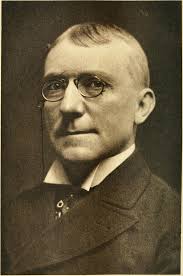Armazindy Page #5
James Whitcomb Riley poems book published in the 1894 book Armazindy and received very negative reviews that referred to poems like "The Little Dog-Woggy" and "Jargon-Jingle" as "drivel" and to Riley as a "worn out genius". Most of his growing number of critics suggested that he ignored the quality of the poems for the sake of making money.
Genre: Poetry
Genre: Poetry
- Year:
- 1894
- 986 Views
For I am no philosopher Of wise elucidation, But speak of things as they occur, From simple observation. I notice little things—to wit:— I never missed a train Because I didn’t run for it; I never knew it rain That my umbrella wasn’t lent,— Or, when in my possession, The sun but wore, to all intent, A jocular expression. I never knew a creditor To dun me for a debt But I was “cramped” or “bu’sted”; or I never knew one yet, When I had plenty in my purse, To make the least invasion,— As I, accordingly perverse, Have courted no occasion. Nor do I claim to comprehend What Nature has in view In giving us the very friend To trust we oughtn’t to.— But so it is: The trusty gun Disastrously exploded Is always sure to be the one We didn’t think was loaded. Our moaning is another’s mirth,— And what is worse by half, We say the funniest thing on earth And never raise a laugh: ’Mid friends that love us overwell, And sparkling jests and liquor, Our hearts somehow are liable To melt in tears the quicker. We reach the wrong when most we seek The right; in like effect, We stay the strong and not the weak— Do most when we neglect.— Neglected genius—truth be said— As wild and quick as tinder, The more you seek to help ahead The more you seem to hinder. I’ve known the least the greatest, too— And, on the selfsame plan, The biggest fool I ever knew Was quite a little man: We find we ought, and then we won’t— We prove a thing, then doubt it,— Know everything but when we don’t Know anything about it. THE OLD SCHOOL-CHUM He puts the poem by, to say His eyes are not themselves to-day! A sudden glamour o’er his sight— A something vague, indefinite— An oft-recurring blur that blinds The printed meaning of the lines, And leaves the mind all dusk and dim In swimming darkness—strange to him! It is not childishness, I guess,— Yet something of the tenderness That used to wet his lashes when A boy seems troubling him again;— The old emotion, sweet and wild, That drove him truant when a child, That he might hide the tears that fell Above the lesson—“Little Nell.” And so it is he puts aside The poem he has vainly tried To follow; and, as one who sighs In failure, through a poor disguise Of smiles, he dries his tears, to say His eyes are not themselves to-day. WRITIN’ BACK TO THE HOME-FOLKS My dear old friends—It jes beats all, The way you write a letter So’s ever’ last line beats the first, And ever’ next-un’s better!— W’y, ever’ fool-thing you putt down You make so interestin’, A feller, readin’ of ’em all, Can’t tell which is the best-un. It’s all so comfortin’ and good, ’Pears-like I almost hear ye And git more sociabler, you know, And hitch my cheer up near ye And jes smile on ye like the sun Acrosst the whole per-rairies
Translation
Translate and read this book in other languages:
Select another language:
- - Select -
- 简体中文 (Chinese - Simplified)
- 繁體中文 (Chinese - Traditional)
- Español (Spanish)
- Esperanto (Esperanto)
- 日本語 (Japanese)
- Português (Portuguese)
- Deutsch (German)
- العربية (Arabic)
- Français (French)
- Русский (Russian)
- ಕನ್ನಡ (Kannada)
- 한국어 (Korean)
- עברית (Hebrew)
- Gaeilge (Irish)
- Українська (Ukrainian)
- اردو (Urdu)
- Magyar (Hungarian)
- मानक हिन्दी (Hindi)
- Indonesia (Indonesian)
- Italiano (Italian)
- தமிழ் (Tamil)
- Türkçe (Turkish)
- తెలుగు (Telugu)
- ภาษาไทย (Thai)
- Tiếng Việt (Vietnamese)
- Čeština (Czech)
- Polski (Polish)
- Bahasa Indonesia (Indonesian)
- Românește (Romanian)
- Nederlands (Dutch)
- Ελληνικά (Greek)
- Latinum (Latin)
- Svenska (Swedish)
- Dansk (Danish)
- Suomi (Finnish)
- فارسی (Persian)
- ייִדיש (Yiddish)
- հայերեն (Armenian)
- Norsk (Norwegian)
- English (English)
Citation
Use the citation below to add this book to your bibliography:
Style:MLAChicagoAPA
"Armazindy Books." Literature.com. STANDS4 LLC, 2024. Web. 17 May 2024. <https://www.literature.com/book/armazindy_946>.




Discuss this Armazindy book with the community:
Report Comment
We're doing our best to make sure our content is useful, accurate and safe.
If by any chance you spot an inappropriate comment while navigating through our website please use this form to let us know, and we'll take care of it shortly.
Attachment
You need to be logged in to favorite.
Log In